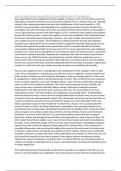Essay
How far was the war responsible for the establishment of the Republic?
- Module
- French Revolution 1774-1799
- Institution
- PEARSON (PEARSON)
The responsibility for the establishment of the republic in France in 1792, from the 20th June to the 10th August, cannot be deemed to be caused by the outbreak of war in spring of that year. Although notable, other underlying problems led up to the establishment of the French republic in 1792. whi...
[Show more]



